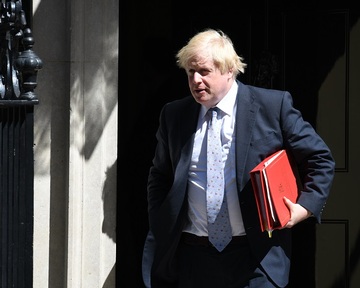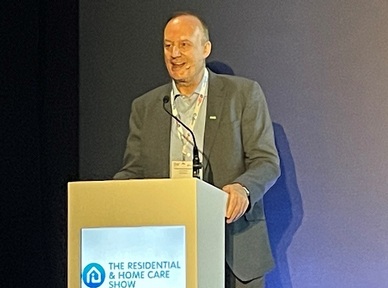Care chief calls Department for Health and Social Care 'shambolic'
Care home leader Martin Green, the chief executive of Care England, has launched a scathing attack on Prime Minister Boris Johnson and called his government’s Department of Health and Social Care (DHSC) “shambolic”.

Speaking at London’s Residential & Home Care Show, Martin Green described Mr Johnson as “in good company” as “like the previous four prime ministers” who promised to fix social care, “none of them had delivered”.
The chief executive said the DHSC, which is run by Secretary of State for Health and Social Care Sajid Javid, had “no strategic direction” and “no proper approaches to how it's measuring success”.
Mr Green said: “We have legislation that is literally being made up as we go along. If you ask people in the DHSC about anything specifically, usually the default position is ‘we’ll get back to you’. Which means ‘we don’t know’.”
Boris Johnson made ‘foolish comments’ about social care and should give £20bn
Mr Green spoke of “missed opportunities” and called the government’s social care reform agenda “a recovery plan for the NHS”.
The new Health and Social Care Levy led to the government taking £39 billion from the pockets of taxpayers but Mr Green points out that the DHSC “immediately gave £35 billion of it to the NHS”.
“Even if the government decided to split it 50/50, that could have been a really big and significant extra amount of money.”
Social care will receive £5 billion over three years from the new levy but some £500m of the money will be spent on workforce development – equating to £312 a year for each employee. But Mr Green said: “This is not going to deliver a high paid, high skilled sector.”
Highlighting that social care in many areas is the biggest employer and that care workers live locally, spend locally and travel locally, he said social care is “the absolute backbone of local economies”.

The boss of Care England, which represents care homes, said: “It was the Prime Minister who told us all that he was going to move to a high-skilled, high paid economy, well there is no better place for him to start than in social care.”
Mr Green spoke of having “grave concerns” that the government’s social care reform agenda will have “seriously negative impacts” partly due to “foolish and unthought out comments” by the Prime Minister.
Mr Green mentioned comments by the PM "about things like ‘you won’t have to sell your home’, ‘self-funders will not have to subsidise publicly-funded residents and service-users’.”
The care leader said: “If he was going to make good on that commitment, he should have allocated about £20 billion to establish a real approach to social care.”
Care home occupancy levels 'not returned to normal'
A self-funder can pay over £1,200 a week in a care home. If the government is going to “equalize” what the local authority is paying to that level, “you need a lot of money”.
“This agenda has started to morph into…’we’re moving towards the eradication of the difference between self-funders and publicly-funded residents’.
“Unless local authority rates in this country treble, they will not be at the level of self-funders and they will not be at the level of the true cost of care."
The day after Sue Gray's 'partygate' report was published, which questioned the Prime Minister's leadership, Mr Johnson made his way to Sweetcroft care home’s Platinum Jubilee Party on 26 May and met care workers and played boules with some of its 21 residents.
Sweetcroft's care home manager Harry Maharaj said: “The Prime Minister and I talked about the care home’s high review ratings on carehome.co.uk and he said ‘Well done’."
Care providers are currently being asked by the DHSC to give data on what the cost of care is but Mr Green says the cost of care should reflect care which delivers on the aspirations of the Care Act rather than about "paying people inadequate salaries" to do difficult jobs.
Mr Green described the social care sector as “fragile” post-covid “for many reasons” and said staff teams are “exhausted”.
Highlighting the challenge of recruitment and retention of staff in the care sector, he said “We are seeing people who can go to other sectors and get more money. Those other sectors are not nearly as difficult, as challenging [as social care].”
As care home occupancy levels “have not returned to normal”, Mr Green added this was putting “an enormous strain” financially on care providers.
34,000 people died, care staff have ‘post-traumatic stress’
Mr Green told the audience that he believed many care staff are suffering from “post-traumatic stress”.
“I’ve had countless stories of people who’d put the people they were supporting even before themselves. Tragically about 34,000 people died in social care during this pandemic. I don’t think we should underestimate the impact that that’s had on our colleagues.
"I think they are in post-traumatic stress many of them. Because of course when you work in social care you establish relationships with the people you support.
“I think that is why we need to have a really clear reform of social care. The legacy of all that sacrifice must be a better tomorrow.”
Latest News
 29-Jul-24
Dementia Bus gives carehome.co.uk staff insight into life with dementia
29-Jul-24
Dementia Bus gives carehome.co.uk staff insight into life with dementia
 01-Mar-24
Find out the top care homes in 2024
01-Mar-24
Find out the top care homes in 2024
 21-Mar-23
UK's top care homes in 2023 revealed
21-Mar-23
UK's top care homes in 2023 revealed
 03-Jan-23
carehome.co.uk launches free care helpline
03-Jan-23
carehome.co.uk launches free care helpline
 13-Dec-22
5 mins with Emily Whitehurst, chief operating officer for Constantia Healthcare
13-Dec-22
5 mins with Emily Whitehurst, chief operating officer for Constantia Healthcare